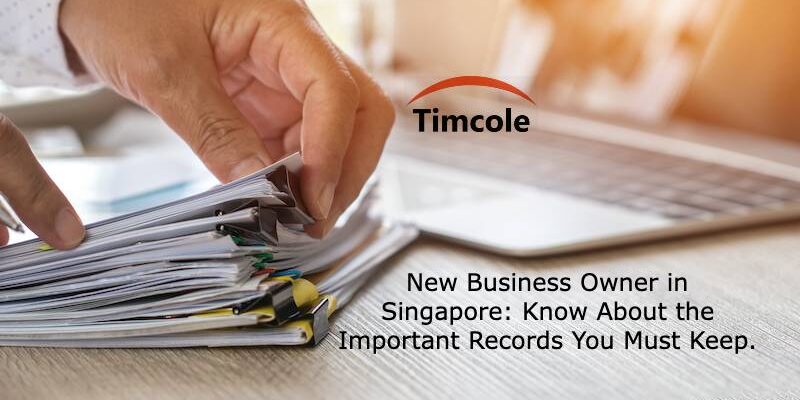If you are just starting your business, a good recordkeeping practice can be highly beneficial to your company. Recordkeeping may not be the first thing that comes to mind when starting a business, but you will realise its importance as you move along. It can help you manage your cash flow, file taxes smoothly, monitor fraudulent acts, and even help you improve your business’ profitability.
What is Recordkeeping and the Reasons to Maintain Records?
Recordkeeping is the pillar and foundation of accounting. Without the records, there can never be an accurate accounting statement; thus, it is vital to maintain all your them. The main reasons for keeping records are as follows:
Legal Obligation
In Singapore, it is required to have a proper recordkeeping system as it helps the company to file its taxes properly. It also supports all the company’s financial transactions within its fiscal year. These records serve as hard proof of transactions that will be used to make accurate financial statements.
Proper Filing of Taxes
As mentioned, accurate accounting starts with good recordkeeping practices. With this, proper recordkeeping will help the company file taxes smoothly. It can support the requirements needed to file its taxes.
Detect Fraudulent Acts
Sometimes, as much as business owners set rules for the company, fraudulent acts are still committed. Other than the financial statements, the best way to prove such acts is through the records maintained. It can quickly provide all the transaction details made in the past. The leaders can then pinpoint which transactions are legitimate and which are not.
What are the Business Records That Must be Kept?
In Singapore, there are two types of registered businesses based on GST. Whether your company is registered as GST or Non-GST, there are records that are required to be kept. To keep you on track which records you should have, below is an overview of what the IRAS requires:
| Type of Record | Required Documents | GST- Registered | Non-GST Registered |
| Records of Sales Transactions | Issued serially numbered receipts, invoices or cash register tapes | Required | Required |
| Issued Tax Invoice | Required | Not Required | |
| Lease/Rental Contract | Required | Required | |
| Returned goods credit notes | Required | Required | |
| Exports related documents | Required | Required | |
| Any evidence that payment has been received | Required | Not Required | |
| Records of Expense Transaction | Received receipt or invoice | Required | Required |
| Contracts/ agreements and payments made to the services rendered for the company | Required | Required | |
| Staff remuneration payment vouchers | Required | Required | |
| CPF contribution of employer | Required | Required | |
| Evidence of payment | Required | Not Required | |
| Records of Purchase Transaction | Received receipts, invoices and tax invoices | Required | Required |
| Imports related documents | Required | Required | |
| Evidence of payment | Required | Not Required | |
| Other Records | Any goods put to non-business use | Required | Required |
| Disposing of business goods | Required | Not Required | |
| Withdrawal of goods from warehouse | Required | Not Required | |
| Accounting Records and Schedules | Stock lists, sales lists, purchase lists | Required | Required |
| General ledgers | Required | Required | |
| Financial statements | Required | Required | |
| Input and output tax account summary | Required | Not Required | |
| Bank statements from both personal and business purposes | Required | Recommended | |
| Public transport, travel and entertainment expenses | Required | Required | |
| Fixed assets schedules | Required | Required | |
| Capital allowances records | Required | Required |
What are the Ways to Keep Records?
There are two ways to keep your records. You can either opt for the traditional way of physically keeping all the paper records or having all the documents digitised and saved in a secure online platform.
If you choose to keep all your documents physically, you should have a good storage space in your office. Take into consideration the environment in which you put all your records. Papers deteriorate easily, and the chances of misplacing your files are high. It is best to keep photocopies of your records if something happens to the original ones.
On the other hand, if you choose to digitise all your records, you need to ensure that the software you are storing your records in is secure, like Xero. Also, you do not need to keep the physical copies of your records because you can already submit the digitised copy when it’s time to file your taxes. All you need to do is scan all your invoices and receipts. You can even take photos and save them to your software.
Whether physically or electronically stored, all these records should be kept where company directors or business owners can easily access them. They should be able to get a hold of these documents quickly if they need them urgently.
How Long Should Records be Kept?
Like most countries, Singapore requires all companies to keep all records for at least five years from the end of the financial year when the latest transactions were made. For instance, your company’s end of financial year is December 2021; all records should be kept until December 31, 2026. The same applies even if your company has already closed. Therefore, you need to ensure that documents remain intact for at least five years from closing.
Are There Consequences for Non-Compliance?
Yes. There are consequences if you do not comply with the requirements needed for recordkeeping. For example, serious implications will occur if your records are not kept and maintained correctly and not preserved for at least five years.
Suppose the requirements of proper recordkeeping are not met. In that case, your company can be fined up to $5,000 in addition to the penalty in accordance with the Company Act, and a possible jail term of up to 12 months will be charged to any related officer of the company. Aside from this, the company will also be fined up to $1,000 and may also face a jail term for up to 6 months under the Income Tax Act. Lastly, another severe consequence your company will face is the disallowance of your company’s capital and expense claims.
Begin Good Recordkeeping Practices as Early as You Start Your Business
As soon as you start your business, you should already have good recordkeeping practices. These practices will be highly beneficial to your company and will be able to help you avoid severe consequences due to non-compliance. Aside from all the legal aspects recordkeeping entails, it also serves as protection and, above all, guidance in keeping track of where your company is that will help you make big decisions to turn your business more profitable.
 Leave it to the professionals.
Leave it to the professionals.
Timcole offers corporate secretarial and accounting services. Contact Timcole to know the corporate regulation your company must comply with.








